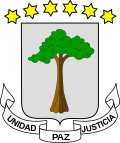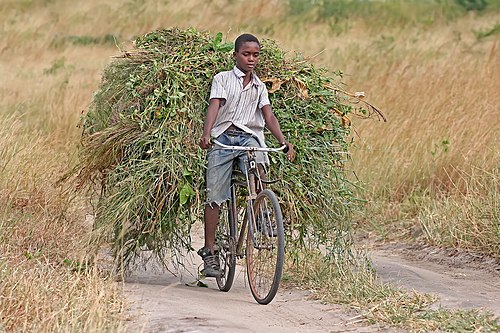Portal:Africa



Africa is the world's second-largest and second-most populous continent after Asia. At about 30.3 million km2 (11.7 million square miles) including adjacent islands, it covers 20% of Earth's land area and 6% of its total surface area. With nearly 1.4 billion people as of 2021, it accounts for about 18% of the world's human population. Africa's population is the youngest among all the continents; the median age in 2012 was 19.7, when the worldwide median age was 30.4. Based on 2024 projections, Africa's population will exceed 3.8 billion people by 2100. Africa is the least wealthy inhabited continent per capita and second-least wealthy by total wealth, ahead of Oceania. Scholars have attributed this to different factors including geography, climate, corruption, colonialism, the Cold War, and neocolonialism. Despite this low concentration of wealth, recent economic expansion and a large and young population make Africa an important economic market in the broader global context, and Africa has a large quantity of natural resources.
Africa is highly biodiverse; it is the continent with the largest number of megafauna species, as it was least affected by the extinction of the Pleistocene megafauna. However, Africa is also heavily affected by a wide range of environmental issues, including desertification, deforestation, water scarcity, and pollution. These entrenched environmental concerns are expected to worsen as climate change impacts Africa. The UN Intergovernmental Panel on Climate Change has identified Africa as the continent most vulnerable to climate change.
The history of Africa is long, complex, and varied, and has often been under-appreciated by the global historical community. In African societies the oral word is revered, and they have generally recorded their history via oral tradition, which has led anthropologists to term them "oral civilisations", contrasted with "literate civilisations" which pride the written word. African culture is rich and diverse both within and between the continent's regions, encompassing art, cuisine, music and dance, religion, and dress.
Africa, particularly Eastern Africa, is widely accepted to be the place of origin of humans and the Hominidae clade, also known as the great apes. The earliest hominids and their ancestors have been dated to around 7 million years ago, and Homo sapiens (modern human) are believed to have originated in Africa 350,000 to 260,000 years ago. In the 4th and 3rd millennia BCE Ancient Egypt, Kerma, Punt, and the Tichitt Tradition emerged in North, East and West Africa, while from 3000 BCE to 500 CE the Bantu expansion swept from modern-day Cameroon through Central, East, and Southern Africa, displacing or absorbing groups such as the Khoisan and Pygmies. Some African empires include Wagadu, Mali, Songhai, Sokoto, Ife, Benin, Asante, the Fatimids, Almoravids, Almohads, Ayyubids, Mamluks, Kongo, Mwene Muji, Luba, Lunda, Kitara, Aksum, Ethiopia, Adal, Ajuran, Kilwa, Sakalava, Imerina, Maravi, Mutapa, Rozvi, Mthwakazi, and Zulu. Despite the predominance of states, many societies were heterarchical and stateless. Slave trades created various diasporas, especially in the Americas. From the late 19th century to early 20th century, driven by the Second Industrial Revolution, most of Africa was rapidly conquered and colonised by European nations, save for Ethiopia and Liberia. European rule had significant impacts on Africa's societies, and colonies were maintained for the purpose of economic exploitation and extraction of natural resources. Most present states emerged from a process of decolonisation following World War II, and established the Organisation of African Unity in 1963, the predecessor to the African Union. The nascent countries decided to keep their colonial borders, with traditional power structures used in governance to varying degrees. (Full article...)
Selected article –
The Battle of Isandlwana (alternative spelling: Isandhlwana) on 22 January 1879 was the first major encounter in the Anglo-Zulu War between the British Empire and the Zulu Kingdom. Eleven days after the British invaded Zululand in Southern Africa, a Zulu force of some 20,000 warriors attacked a portion of the British main column consisting of approximately 1,800 British, colonial and native troops with approximately 350 civilians. The Zulus were equipped mainly with the traditional assegai iron spears and cow-hide shields, but also had a number of muskets and antiquated rifles.
The British and colonial troops were armed with the modern Martini–Henry breechloading rifle and two 7-pounder mountain guns deployed as field guns, as well as a Hale rocket battery. The Zulus had a vast disadvantage in weapons technology, but they greatly outnumbered the British and ultimately overwhelmed them, killing over 1,300 troops, including all those out on the forward firing line. The British were unprepared for the attack from the large Zulu contingent, which had moved quickly, and were attacked along the flanks by the Zulus using their traditional 'horns and chest of the buffalo' formation. The Zulu army suffered anywhere from 1,000 to 3,000 killed. (Full article...)
Featured pictures –
Did you know (auto-generated) -

- ... that Albert Luthuli was the first African to win the Nobel Peace Prize?
- ... that Gil Scott-Heron's 1975 song "Johannesburg" was banned in South Africa during apartheid?
- ... that Freetown, Alabama, was founded by free and formerly enslaved African Americans in Alabama, whose church, built in 1929, burned down in 2022?
- ... that Dahiru Musdapher, the 12th chief justice of Nigeria, was once a BBC World Service contributor for West Africa and Hausa?
- ... that the Bethel African Methodist Episcopal Church in Springtown, New Jersey, was used by Harriet Tubman to help fugitive slaves escape?
- ... that the African Union has set up a space agency in a Space City?
Categories
Selected biography –
Professor Reuben James Olembo (1937–2005) was a prominent Kenyan academic, scientist and environmentalist. He was a deputy executive director of the United Nations Environment Programme (UNEP), which he played a pivotal role in helping found, and United Nations Assistant Secretary General from 1994 to 1998. He became the Acting Secretary General of the Convention on International Trade in Endangered Species of Wild Fauna and Flora (CITES), after his retirement from UNEP. (Full article...)
Selected country –
 |
 |
|

| ||
Equatorial Guinea, officially the Republic of Equatorial Guinea, is a country in Central Africa. One of the smallest countries in continental Africa, Equatorial Guinea comprises a mainland territory known as Río Muni (including several offshore islands), the island of Bioko (formerly Fernando Pó), where the capital Malabo (formerly Santa Isabel) is located, and the island of Annobón in the South Atlantic Ocean. It is bordered by Cameroon on the north, Gabon on the south and east, and the Gulf of Guinea on the west, where the island nation of São Tomé and Príncipe is located.
Formerly the Spanish colony of Spanish Guinea, its post-independence name is suggestive of its location near both the equator and the Gulf of Guinea. It is the only country in mainland Africa where Spanish is an official language, excluding the Spanish exclaves of Ceuta and Melilla, and the UN-recognised but Moroccan-occupied Sahrawi Arab Democratic Republic (Western Sahara). The discovery of sizeable petroleum reserves in recent years is altering the economic and political status of the country. (Read more...)
Selected city –

Tangier (/tænˈdʒɪər/ tan-JEER; Arabic: طنجة, romanized: Ṭanjah, [tˤandʒa], [tˤanʒa]) is a city in northwestern Morocco, on the coasts of the Mediterranean Sea and the Atlantic Ocean. The city is the capital of the Tanger-Tetouan-Al Hoceima region, as well as the Tangier-Assilah Prefecture of Morocco.
Many civilisations and cultures have influenced the history of Tangier, starting from before the 10th century BCE. Starting as a strategic Phoenician town and trading centre, Tangier has been a nexus for many cultures. In 1923, it became an international zone managed by colonial powers and became a destination for many European and American diplomats, spies, bohemians, writers and businessmen. That status came to an end with Moroccan independence, in phases between 1956 and 1960. (Full article...)
In the news
- 1 May 2025 –
- Kenyan parliament member Charles Ong'ondo is shot to death in Nairobi by unknown gunmen on a motorcycle in an apparent assassination. (BBC News)
- 30 April 2025 – Puntland–Somaliland dispute
- Las Anod conflict, Puntland–Somaliland prisoner exchange
- Puntland releases fifteen prisoners of war in exchange for Somaliland releasing eleven combatants captured during the conflict in the contested Sool region. This is the second prisoner exchange of prisoners captured during the conflict in Las Anod. (Hiiraan Online) (Horn Observer)
- 30 April 2025 – Foreign relations of Taiwan, Somaliland–Taiwan relations
- Amid strengthening ties between Taiwan and Somaliland, the Somali government announces a ban on the entry and transit of Taiwanese passport holders through Somalia citing United Nations Resolution 2758 and the One China policy. In response, Taiwan warns its citizens against traveling to Somaliland or Somalia and lodges a protest with the Somali government. (BBC News) (Reuters)
- 29 April 2025 – Boko Haram insurgency
- At least 26 people are killed when a truck hits a roadside bomb in Borno State, Nigeria. (Al Jazeera)
- 28 April 2025 – Red Sea crisis
- The Houthis claim at least 68 people are killed and 47 others are injured in a U.S. airstrike on a prison holding African migrants in Saada Governorate, Yemen. (AP)
Updated: 7:05, 2 May 2025
General images -
Africa topics
More did you know –
- ...that from 1926 to 1940, the Union Minière du Haut Katanga had a virtual monopoly of the world uranium market?
- ...that Anfillo is an endangered language of Western Ethiopia, spoken only by a few hundred adults above sixty?
- ...that Bono Manso, the capital of Bono state, was an ancient Akan trading town in present-day Ghana, which was frequented by caravans from Djenné as part of the Trans-Saharan trade?
- ...that Reverend John Chilembwe is celebrated as the first Malawian nationalist, and was a martyr for his cause?
Related portals
Major Religions in Africa
North Africa
West Africa
Central Africa
East Africa
Southern Africa
Associated Wikimedia
The following Wikimedia Foundation sister projects provide more on this subject:
-
Commons
Free media repository -
Wikibooks
Free textbooks and manuals -
Wikidata
Free knowledge base -
Wikinews
Free-content news -
Wikiquote
Collection of quotations -
Wikisource
Free-content library -
Wikispecies
Directory of species -
Wikiversity
Free learning tools -
Wikivoyage
Free travel guide -
Wiktionary
Dictionary and thesaurus


























































































